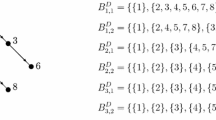Abstract
The present study discusses a twist in hierarchical rules embedded in a spatial game system. In the typical spatial games, each player has its own strategy, and determines its action on the strategy; its action does not determine its strategy. On the dominance relationship between rules, the strategy is an upper-level rule against the action. This means the game has a hierarchy on rules. The present study in order to discuss a twist between rules, introduced a rule determining a player’s strategy from its immediate neighbor’s actions. This introduction results in not to decide which of a strategy and an action is placed in an upper-level. The present paper reports the results about dynamical behaviors observed in a spatial game system with a twist in its hierarchical rules.
Access this chapter
Tax calculation will be finalised at checkout
Purchases are for personal use only
Preview
Unable to display preview. Download preview PDF.
Similar content being viewed by others
References
Jerne, N.K.: Towards a network theory of the immune system. Annuals d’Immunologie 125C, 373–389 (1974)
Hofstadter, D.R.: GÖDEL, ESCHER, BACH. Basic Books, Inc., New York (1979)
Nowak, M.A., May, R.M.: Evolutionary games and spatial chaos. Nature 356, 826–829 (1992)
Ishida, Y., Katsumata, Y.: A Note on Space-Time Interplay through Generosity in a Membrane Formation with Spatial Prisoner’s Dilemma. LNCS, vol. 5917, pp. 448–455. Springer, Heidelberg (2008)
Author information
Authors and Affiliations
Editor information
Editors and Affiliations
Rights and permissions
Copyright information
© 2010 Springer-Verlag Berlin Heidelberg
About this paper
Cite this paper
Harada, K., Ishida, Y. (2010). A Note on Dynamical Behaviors of a Spatial Game Operated on Intercrossed Rules. In: Setchi, R., Jordanov, I., Howlett, R.J., Jain, L.C. (eds) Knowledge-Based and Intelligent Information and Engineering Systems. KES 2010. Lecture Notes in Computer Science(), vol 6278. Springer, Berlin, Heidelberg. https://doi.org/10.1007/978-3-642-15393-8_71
Download citation
DOI: https://doi.org/10.1007/978-3-642-15393-8_71
Publisher Name: Springer, Berlin, Heidelberg
Print ISBN: 978-3-642-15392-1
Online ISBN: 978-3-642-15393-8
eBook Packages: Computer ScienceComputer Science (R0)




